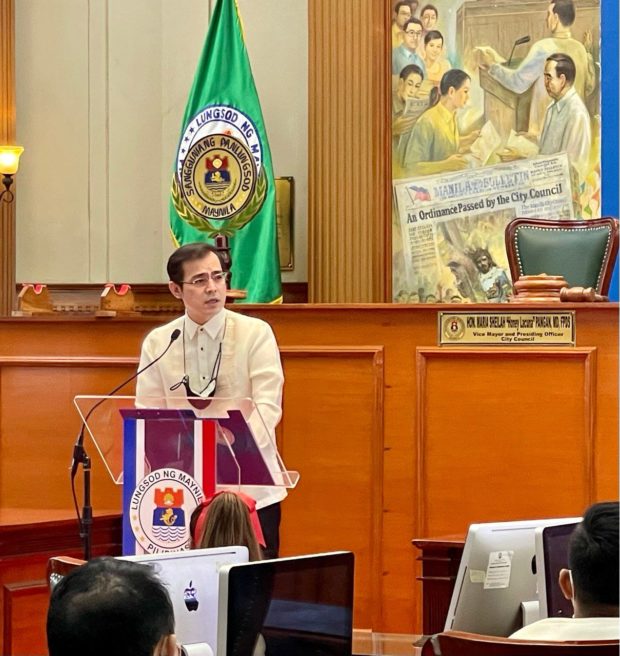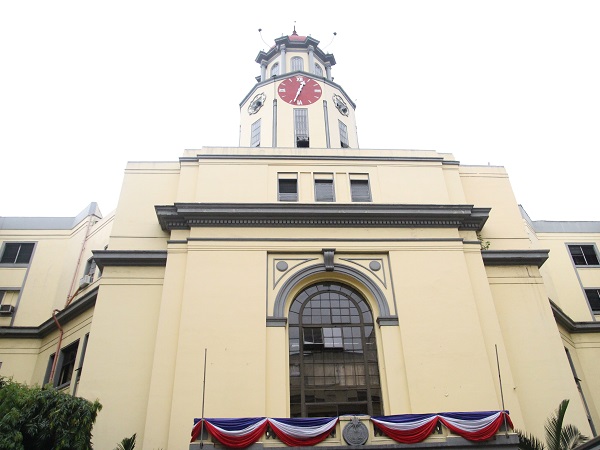Isko Moreno sums up City of Manila’s COVID-19 response and challenges
MANILA, Philippines – Despite a long, hectic day amid the COVID-19 pandemic, Manila Mayor Francosco “Isko Moreno” Domagoso remained energetic, pumped up by a venti-sized cup of black coffee.
Clad in a black T-shirt emblazoned with “Taas Noo, Bakunado”, Moreno was geared up for his next appointment, the inauguration of a sports complex in Tondo district.
At City Hall, the mayor’s official room is neatly decked with the city’s official seal and flag and formally arranged neoclassical furniture.
The hard work is carried out in what he calls the “laundry area,” referring to the adjacent meeting room with a conference table, cluttered with reports, a box of masks, office supplies and small, unopened gifts.
Office/quarantine quarters
He then showed the corner with a folding bed and pillows on which he had been sleeping during the lockdowns.
Article continues after this advertisement“I don’t go home during ECQ (enhanced community quarantine). In our little way, we try to run the city with 24-hour services,” he said.
Article continues after this advertisementMoreno and the city he runs has been in the news lately.
For one, Manila was the only city in the National Capital Region that is not under COVID-19 Alert Level 4.
Last week, Malacañang nitpicked on his statement about people needing medicines more than face shields; he was vilified by the Palace, saying the comment had a hidden political agenda.
Characteristically, he shot back to prove that he was no pushover.
Tackling COVID early on
When COVID-19 emerged in December 2019, he had the foresight that the Philippines would be badly hit.
On a trip to London to meet urban planners in early 2020, Moreno and his team visited the Foreign and Commonwealth Office Coronavirus Task Force to learn about the United Kingdom’s COVID game plan.
“There is no playbook for the pandemic,” he said.
“We learned what we could apply. The least that we could do was to preempt the spread since it couldn’t be stopped, and cushion the socioeconomic impact.”
He added that policies go hand in hand with swift action.
Every day, he sifts through data on infections, vaccinations, testing and contact tracing. Hard evidence has helped him make projections and anticipate needs.
When the World Health Organization and the Department of Health approved Tocilizumab, an immunosuppressive drug, and Remdesivir, an antiviral medicine, Moreno promptly placed orders for the city’s COVID-19 patients.
“Based on data and learning from experiences abroad, we acted immediately. It turned out that people needed them. Not everybody survived, but many did,” said Moreno.
Instead of relying on other government agencies which, he remarked, were found wanting in responsibility, he initiated several projects.
Preparing for the worst
“You prepare for the worst,” he said, looking at such high-risk neighbors as Malaysia, Indonesia and India.
Last year, 16 quarantine facilities were built that prepared the city for the case surge last March.
The City of Manila established the country’s only COVID field hospital, located at Rizal Park, for moderate to severe cases.
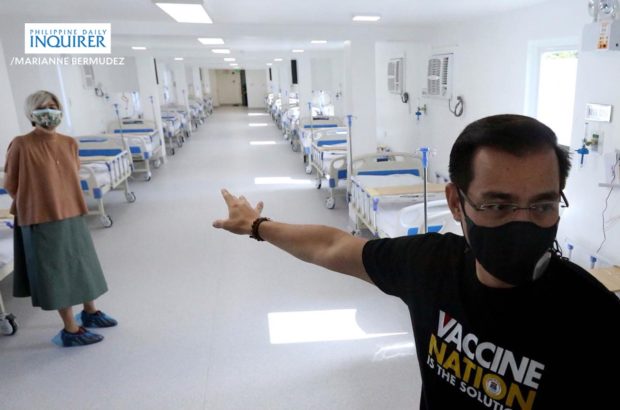
Manila Mayor Isko Moreno inspects the 336 bed COVID-19 Field Hospital built temporarily at the Luneta park, which will accommodate mild to moderate COVID-19 patients. (INQUIRER file photo / Marianne Bermudez)
The city stepped up orders for more advanced hospital equipment to expand the capacity of intensive care units.
Public hospitals level up
In the past, Moreno said, the public had a negative perception of a public hospitals.
The city government has since established two swab laboratories and beefed up its equipment.
It put up a dialysis center and a separate area for COVID-infected dialysis patients.
Sta. Ana Hospital today is at the forefront of the city’s pandemic response.
It has reported better recovery rates from the patients and no COVID fatality from the staff compared to other hospitals.
Almost 70% fully vaccinated
As of posting time, 95 percent of Manileños have gotten their first COVID-19 vaccine dose, while 68.96 percent are fully vaccinated.
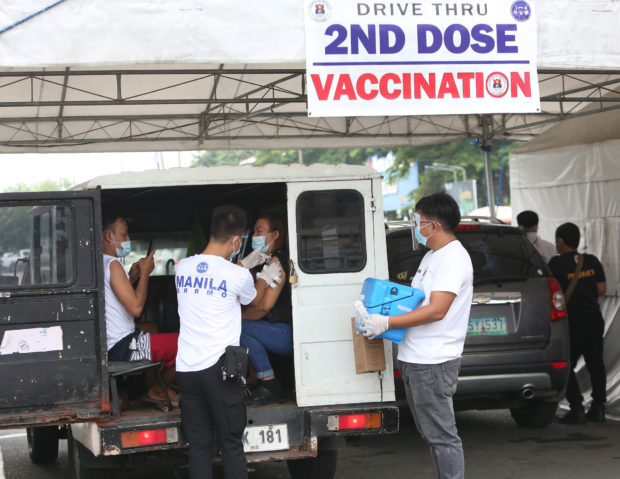
VIRUS PROTECTION People receive their COVID-19 vaccines inside their vehicles at a drive-thru vaccination center in Manila (MARIANNE BERMUDEZ / INQUIRER file photo)
Mass vaccinations continue while free swab tests detect more infections and safeguard the community.
Vaccination = protection
“I believe vaccination is the solution to help protect the people, because infection is inevitable. I got infected after getting jabbed with Sinovac. The vice mayor, too,” said Moreno, acknowledging that the vaccine spared them from the severity of the disease.
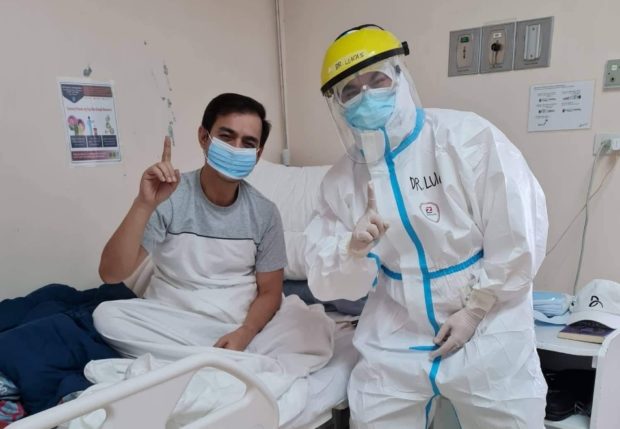
Sta. Ana Hospital director Dr. Grace Padilla visits Mayor Francisco ‘Isko Moreno’ Domagoso at the Sta. Ana Hospital (Photo coutesy Manila PIO)
The city set up its own storage facilities for the vaccines.
“Pinaghahandaan ito bago magkaleche-leche (This is in preparation before the situation is aggravated),” he said.
Data as of September 9, 2021 showed that there are 1,314 active cases (1.67 percent) and a recovery rate of 96 percent (around 75,000 recoveries) out of a population of 1.9 million.
A graph showed a downward trend on infection rates.
Yet Moreno was modest saying that city’s system was far from perfect.
“COVID is a very fluid situation,” he said.
Focus: Minimum basic needs
Shifting to the subject of welfare, he wondered: “Why is the outlook still optimistic in Manila? Last December, I readjusted the government expenses.”
The food security program funds were prioritized over road construction.
Over the past six months, some 700,000 families received monthly food boxes to cushion the economic impact of the pandemic restrictions.
“Maparamdam ko lang sa inyo na may gobyerno (I want all of you to feel the presence of the government), he said.
“I believe in MBN, minimum basic needs—education, health care, housing and jobs.”
Moreno cited ongoing developments, such as vertical housing projects similar to Singapore and a community townhouse in Baseco, Tondo.
“We want to bring back dignity to our people. In Manila, informal settlers and renters can have the opportunity to own a home through the in-city vertical housing program.”
Three 10-story public school buildings are underway despite the remote learning situation in the country.
“Use your adversity to your advantage. Stimulate the economy by providing more infrastructure developments that address social problems,” he said.
“The educational facilities are meant to achieve our goals of improving the ratio of students to teacher.”
Creating opportunities
Barring government restrictions, his target is to resume some normalcy amid the viral outbreak.
“How do we move forward if there are abrupt reversals in decisions? Many are starving because decisions are made on a whim,” he said in Filipino.
“People will get confused and tired. How many people all over the country are suffering—emotionally and economically? People are losing their jobs. We cannot keep on providing their basic needs every single day. We have to create opportunities so that people can work and support their families.”
Towards the end of the interview, he read the blessing card from the cake given by the Brahma Kumaris, a United Nations-affiliated nongovernmental organization.
It read: “You sparkle with the natural beauty of a peaceful mind and a generous heart.”
Asked if the message applies to him, Moreno then spelled out the qualities of the leader: “Pasensya (patience), pag-unawa (understanding), pagmamalasakit (caring for others) and passion. If you imbibe these, people will listen to you. The government and the people should work hand in hand.”
gsg
For more news about the novel coronavirus click here.
What you need to know about Coronavirus.
For more information on COVID-19, call the DOH Hotline: (02) 86517800 local 1149/1150.
The Inquirer Foundation supports our healthcare frontliners and is still accepting cash donations to be deposited at Banco de Oro (BDO) current account #007960018860 or donate through PayMaya using this link.
